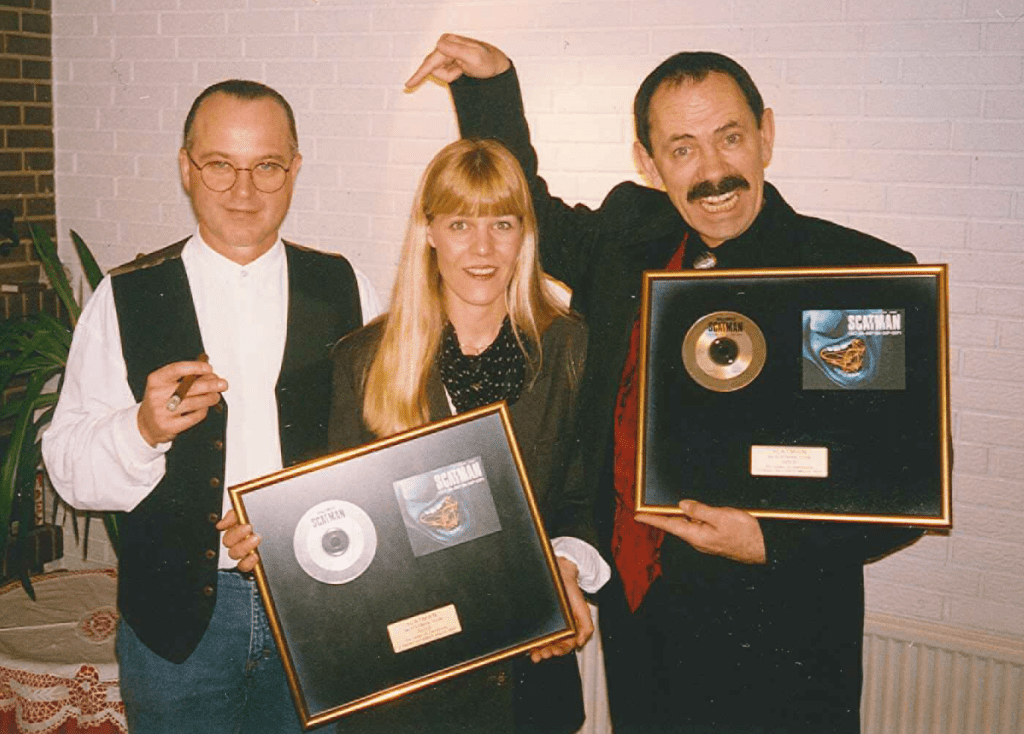John Paul Larkin was born in El Monte, California, on 13th March 1942.
John stuttered ever since he started talking. He recalled he “couldn’t remember ever being fluent.”
When he was growing up in nearby El Sereno, John used to pretend to play piano on his mother’s coffee table, until he got his own at the age of 12.
At 14, John heard Ella Fitzgerald’s ‘How High the Moon’. This song was his introduction to scat-singing, and to Jazz, along with the likes of trumpeter Louis Armstrong, Stan Getz, John Coltrane, Art Pepper and Bud Shanks; musicians John was influenced by from an early age.

(c) John Larkin Archive

(c) John Larkin Archive
“Scat” is a jazz art form that improvises a melody using random syllables and noises with the voice.
John considered scat-singing to be a type of “freed stuttering.” He thought of scat-singing as his first language.
John’s stuttering problem made his childhood traumatic and turbulent. He was bullied (often severely) and endured physical and emotional abuse.
The piano became his outlet for expression. “Playing piano gave me a way to speak,” John said in a 1996 interview. “I hid behind the piano because I was scared of talking.”
John took his first drink at 14, and when he realized it made him feel better, the problem escalated. By the time he was 18, John was playing piano in bands around Southern California, and drinking had become a regular part of his life.
John became the professional jazz pianist he had always wanted to be. After “playing almost every Jazz club in Los Angeles”, John’s personal life became increasingly unbearable.
He had moved onto hard drugs, including cocaine and heroin, and his alcoholism still had a hold on him. “I wanted so much just to be somebody,” he said, “I had such great feelings of inferiority. I was depleted… physically, mentally, spiritually.”

(c) John Larkin Archive

(Joe Farrell, John Larkin, Bob Harrison, Clark Woodard)
(c) John Larkin Archive
In 1984, John was still playing Jazz, and recorded his first album with saxophonist Joe Farrell. Titled “John Larkin”, he released it under his own ‘Transition’ label.
Joe Farrell died in 1986. Around the same time, John decided, “Enough is enough.” Admitting he was totally defeated by drugs and alcohol, John decided to clean himself up.
Subsequently, this album he’d recorded whilst still high on drink and drugs was shelved, and he hid most of the copies at home. It has now resurfaced and is lauded as an accomplished avant-garde jazz album.
During his recovery from drugs and alcohol, he met Judy McHugh, the granddaughter of comedian Eddie Cantor and renowned songwriter Jimmy McHugh.
Judy encouraged John to pursue his career as a Jazz pianist. He did, and added singing to his act after getting standing ovations in several of his performances.
“She made me feel like I was enough,” he once said, and reflected that upon their meeting, she had tried to persuade him how talented he was.
It was Judy who directed and supported John when they moved to Berlin, Germany, in 1990 to further John’s career.

They were married in 1994.
(c) John Larkin Archive

(c) John Larkin Archive
After getting over initial culture shock, John began playing on cruise ships and hotels around Europe.
These were gigs secured by Manfred Zahringer, the founder of Iceberg Records in Denmark. One day Judy handed Manfred a tape containing John’s usual jazz standards, but at the end of it was some of his best “scat singing.”
Manfred had an idea: combine John’s scat-singing with techno and dance, which had never been done before. John was sceptical but said he’d try it, so Manfred signed John to the Iceberg label.
Iceberg Records planned a single and album and licensed it worldwide (minus the Nordic Countries) to RCA.
John was sent off to Catania Studios in Bottrop, Germany, where producers Tony Catania and Ingo Kays sampled John’s scatting syllables and created a “hook” that would become the first single, “Scatman (Ski-Ba-Bop-Ba-Dop-Bop)”.
Rather than being excited about the song’s potential, John’s main fear was the world discovering he stuttered.
Judy suggested he talk about stuttering in the song, and use it to inspire kids – resulting in “if the Scatman can do it, so can you”. John also re-used some older lyrics from his 1986 album.
John chose the stage name “Scatman John” and later would cultivate a classic “jazz” look in a hat and suit.

(c) Iceberg Music Group

(c) John Larkin Archive
The single was released in Europe, and became a huge hit. “Scatman” reached number one in almost every country it was released in, selling millions of copies. At the age of 52, John had suddenly become a “popstar.”
Mildly shocked by his success, John decided that “Scatman” could be used as a vehicle to help others. He doubled down on writing lyrics that dealt with overcoming adversity, accepting yourself as you are, and finding peace in a crazy world – all relating back to his own experience.
He became an advocate and hero within the stuttering community, and earned several awards for his contribution, even setting up a foundation to help people who stutter.
The second single, ‘Scatman’s World’ was also successful. His album of the same name sold nearly two million copies in Japan alone, where he remains one of the most successful overseas artists of all time.
He went on to record two more albums and multiple singles, selling more than 4.5 million albums, 4.5 million singles, and over 35 million compilations worldwide, going 17x gold and 22x platinum.
He won many awards, including ‘Artist of the Year’ in Japan, an Echo Award in Germany, MTV Europe nominated him as Best Male Artist, and he was also awarded Europe’s Goldena Award.
Despite all this, John remained level-headed, probably because fame came to him in his 50s. His central ambition remained: to help kids “of all ages” through his music.

(c) Iceberg Music Group

(c) John Larkin Archive
Sadly, John’s time in the limelight was cut unexpectedly short. John’s health began to fail in 1998, yet he still managed to record “Take Your Time,” his third album.
He was later diagnosed with lung cancer. Around this time, it was rumoured he had collapsed on stage (untrue, because John never performed in public again).
John’s uplifting attitude never faded. He famously told his friend Gina towards the end of his life: “Whatever God wants is fine by me. I’ve had the very best life. I have tasted beauty.”
John’s condition worsened, and he died on the 3rd of December at his home in Los Angeles. He was 57. His ashes were scattered at sea near Malibu, California, in 2001.
The “Scatman” legacy continues to this day.
The original “Scatman” single has been sampled and covered hundreds of times. His songs have also become viral internet memes, amassing over 300 million plays on his official YouTube channel, and over 200 million Spotify streams.
John’s message is evergreen. In his own words:
“My greatest problem in my childhood is now my greatest asset. I’m trying to tell the kids today that Creation gave us all problems for a purpose, and that your biggest problems contain a source of strength to not only step over those problems, but all our other problems as well.”
If you’ve only just discovered him, welcome to Scatman’s World, and check out the Discography.

(c) Iceberg Music Group
Biographies
Did you know John, or has he had a special impact on your life? If so, please contact us here.
“Who’s the Scatman?” – By Jeff Chi. A German comic biography published in 2022 by Zwerchfell Verlag.